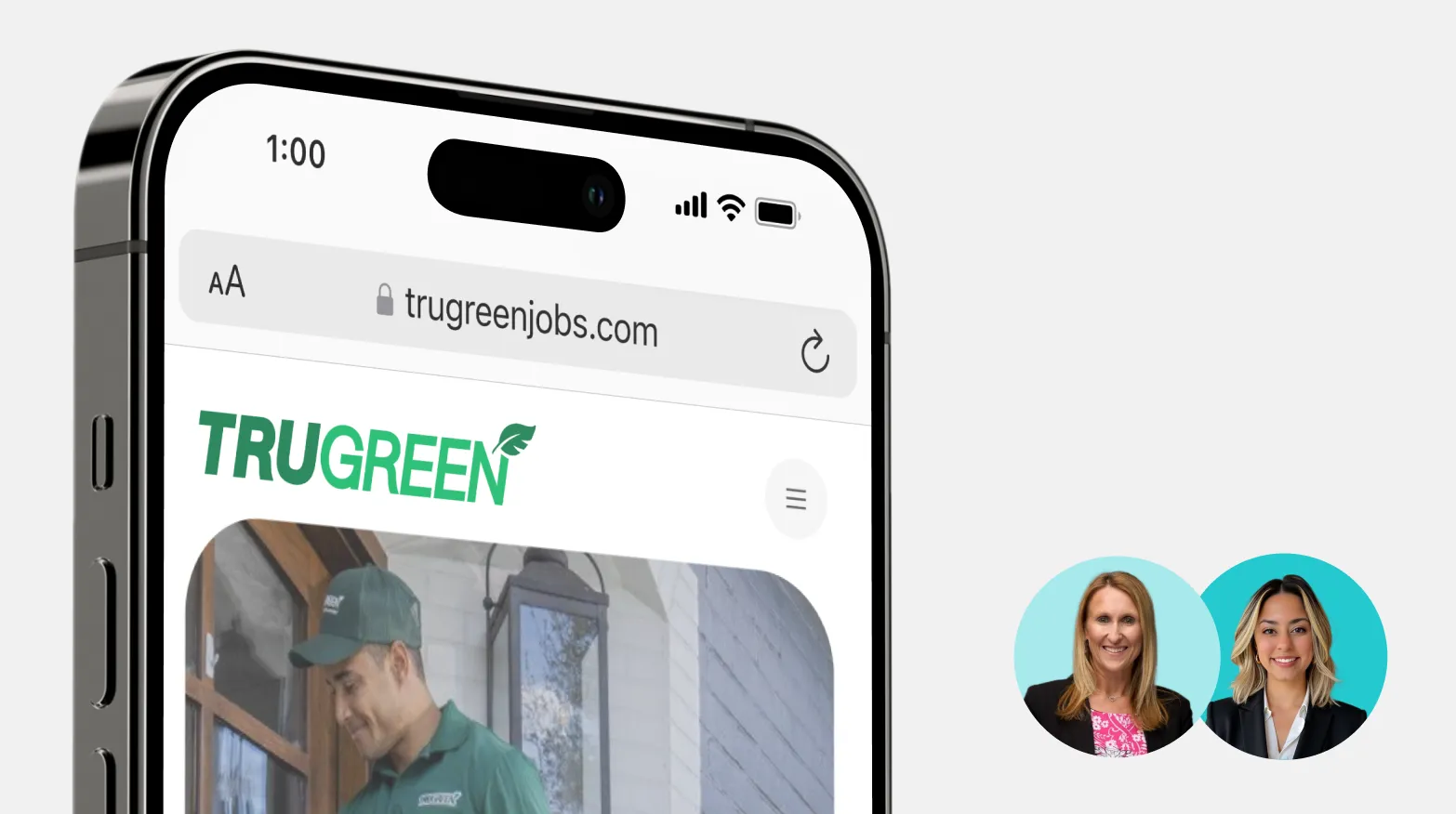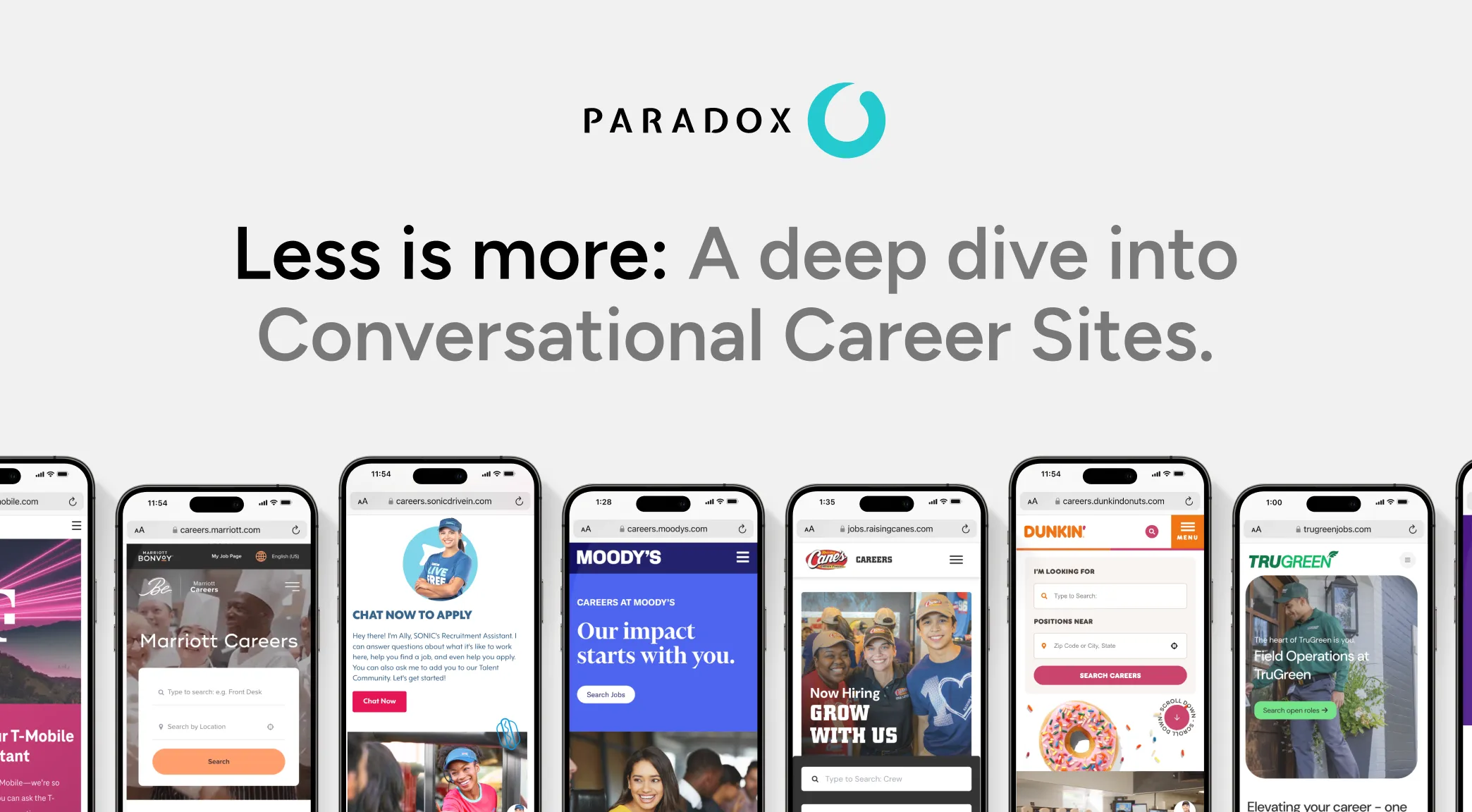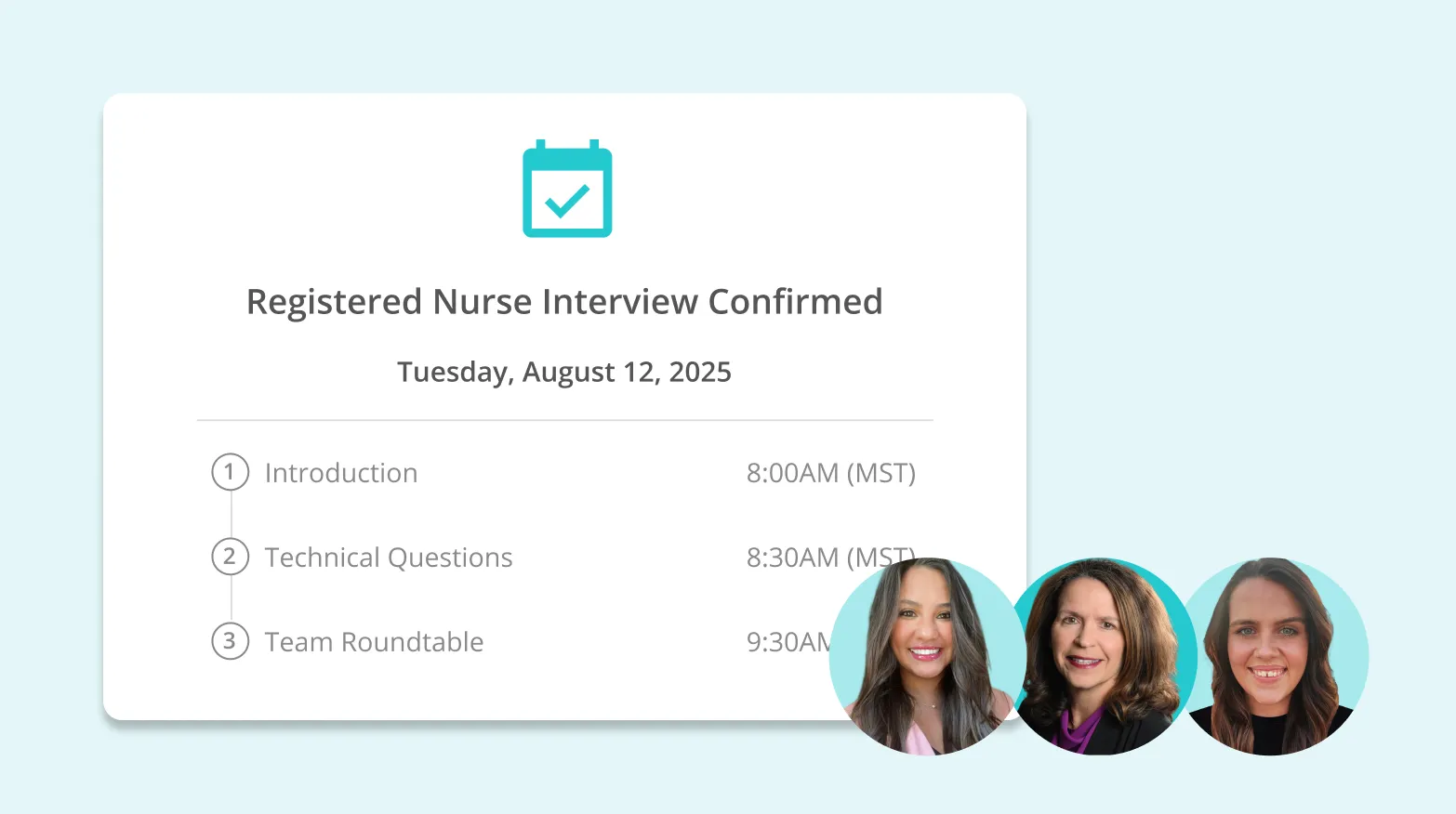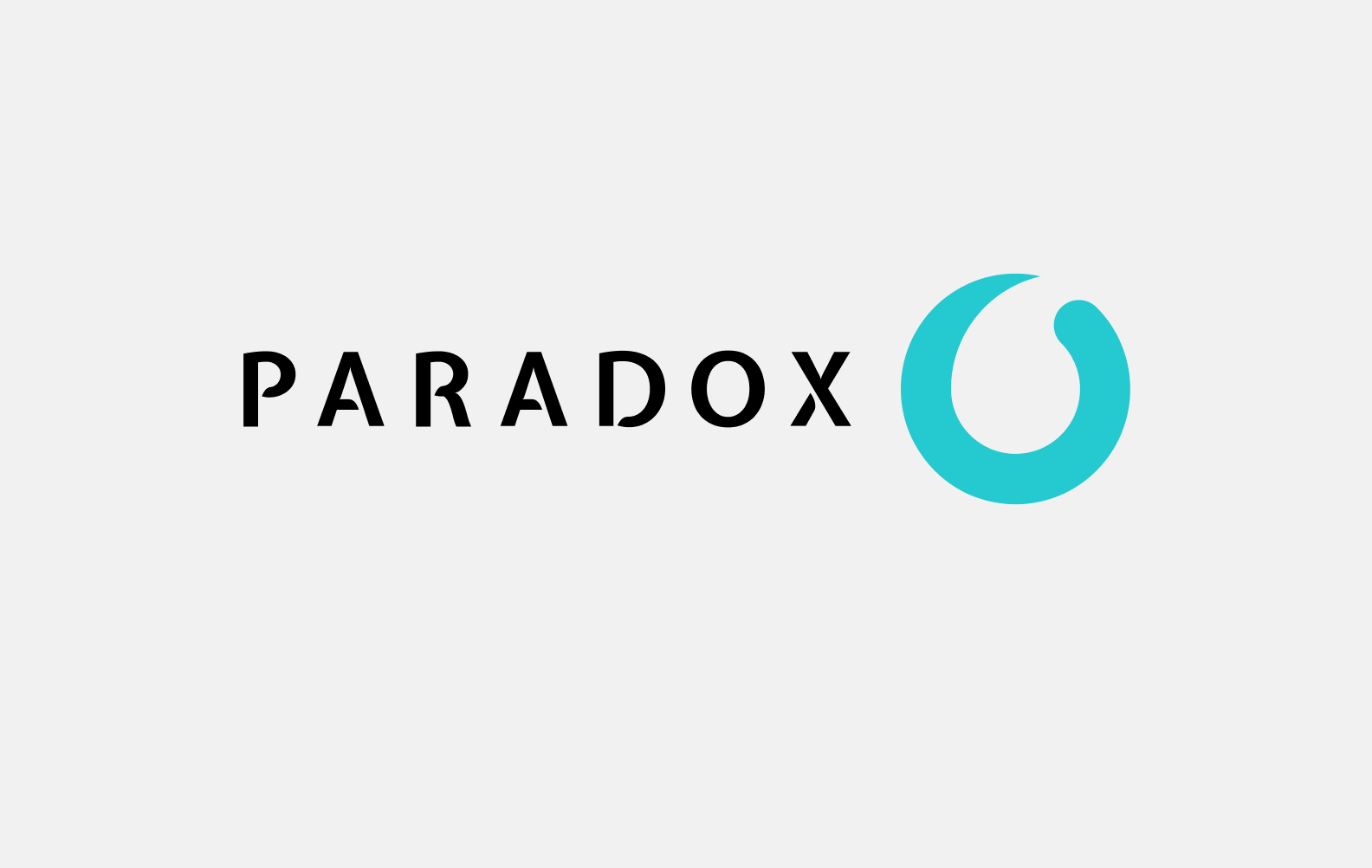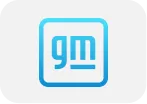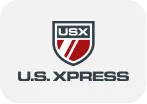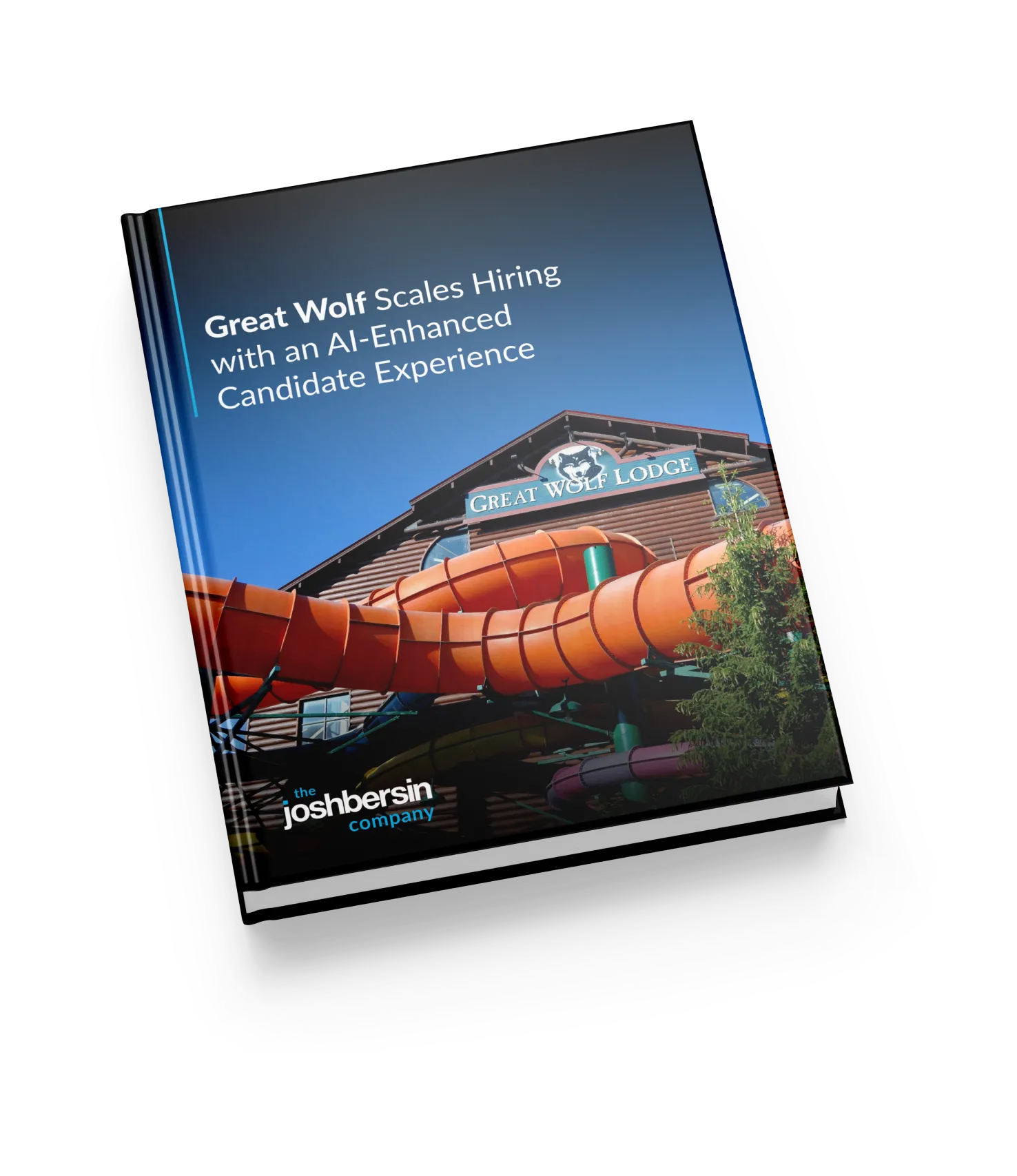SAP Compact Webinar: How Kerry Group is using AI to transform their approach to TA.
Lyndsey Taylor & Nicola Lambert walk us through how Kerry Group is transforming their talent acquisition process with Paradox and SAP SuccessFactors. Ultimately creating better experiences, improving candidate conversion, and increasing efficiency across the hiring journey.

SAP Compact Webinar: How Kerry Group is using AI to transform their approach to TA.
Lyndsey Taylor & Nicola Lambert walk us through how Kerry Group is transforming their talent acquisition process with Paradox and SAP SuccessFactors. Ultimately creating better experiences, improving candidate conversion, and increasing efficiency across the hiring journey.
Kerry Group is an international leader in taste & nutrition innovation.
Kerry Group previously struggled with a large tech stack consisting of multiple technologies that failed to interact with one another. The system was reactive and often required manual intervention from recruiters — causing the organization to seek a hiring platform that invited seamless integration with SAP SuccessFactors and reduced administrative tasks for their team.
The talent acquisition leaders at Kerry Group discuss:
- How to implement a new technology into your hiring process within a global organization.
- How to incorporate feedback throughout to organization into your hiring process.
- How to build out a knowledge base for automated candidate care through conversational software.
- How impactful an integration with conversational software can be with SAP SuccessFactors.
Meet the speakers.

Over 20 years of experience in hands-on leadership positions within Talent Acquisition, Talent Management, Training, L&D, Technology, Assessments, and Performance Management for global businesses.

Over 20 years of experience in hands-on leadership positions within Talent Acquisition, Talent Management, Training, L&D, Technology, Assessments, and Performance Management for global businesses.

Managing the strategic SuccessFactors alliance for the EMEA and MEE region.

Building category creating partnerships at Paradox.

Experienced and decisive Transformation and Strategic Programme Leader working across globally complex matrix environments.
Watch the on-demand webinar:
This transcript has/will be slightly edited for understanding.
Reng Vlasman (00:00):
Hello and welcome everybody to the SAP Compact plus HX M webcast. My name is Klok from sap, and today's session is on one of the most trending topics on the CHRO's agenda, which is on talent acquisition. Using artificial intelligence, we are very proud to have our customer carry group sharing their journey of using AI to transform their approach to talent acquisition. We will host you for the next 45 minutes and leave plenty of time for q and a in between and if it fits after the session. So don't hesitate to post your questions in the chat. Now, please let me welcome Lindsey Taylor and Nicola Lamb from Kerry Group and Richard Millington from Paradox
Richard Millington (00:42):
Reng. Thank you. Good morning everybody. Thank you all for spending time with us today. Fabulous to have you here Lindsey and and Nicola. Before we jump into the details, perhaps you would take a second to introduce yourself and, and share a little bit more about Kerry Group.
Lyndsey Taylor (01:03):
Absolutely. Thanks Richard. I'm actually looking at some of the attendees list and some of these people know me rather well, and it's lovely to see some names there that I recognized from many years ago. So I'm Lyndsey. This is officially my 25th year in talent acquisition. I feel old for saying that, but I have been leading regional, multi-regional and most recently global teams now for the majority of my career. I'm a mom of a five year old and I am, am very passionate about supporting research into dementia. So I'm a dementia helpline volunteer in my spare time. Nicola.
Nicola Lambert (01:52):
Thanks Lindsey. Hi everyone. My name is Nicola. I'm with the care group. I've been with the care group for just under 18 months. But similar to, to Lindsay, I've been in talent acquisition for a number of years. It's just over 10 years involved in various types of talent acquisition, transformation, strategic projects and initiatives to try and drive and evolve the function. I've been in hr for over 15 years you know, working in shared service environments, et cetera, and building out centers of excellence. And I'm based in London in the uk so great to be here and look forward to the conversation.
Richard Millington (02:40):
Fantastic, thank you both. Alright, let's jump in. So, so, so Lindsay, day one, you walked into into Kerry Group. Can you, can you paint a picture for us as to what you what you were met with in terms of technology and process and those kind of those kind of topics?
Lyndsey Taylor (02:58):
Yeah, so day one was certainly it wasn't a surprise because I knew during the recruitment journey and the process some of the things that I was coming into, but it's never quite the same until you're in the business. What, what I would say I walked into was incredibly reactive transactional recruitment, very regionally focused. So there, there wasn't really much in the way of joining the dots and, and having maybe some more standard ways of working quite fragmented and inconsistent processes. And again, we had a lot of ownership there regionally. But the, you know, it was the, you could see a lot of best practice out there, but not being shared across the other regions. And I would say when it comes to technology, oh my gosh, there was so many pieces that made up the tech stack, but it, none of them seemed to talk to anyone. And the one thing that was very apparent to me is, our one source of truth is SAP success factors. And if they're not talking to that, then what value are, are they adding? And I think the last thing was just for me, the lack of analytics. You know, just kind of, Hey, how many requisitions do we have? What, how are we doing? How are we trending this time last year? So again just kinda very bare minimum information in the way of a lot of manual intervention and therefore reactive use of data.
Richard Millington (04:32):
Yeah. What what do you think the impact to the business was of doing things in that way?
Lyndsey Taylor (04:37):
I think depending on the region there was some pockets of success. So there was certainly some regions where it was working incredibly well. But if we look at things holistically due to the very nature of what we do in talent acquisition, I don't think it matters which company you are working with or for. There's an element of reactive nature there. But you could see that our stakeholders or hiring managers or HR business partners, they were frustrated. There was a lot of escalations, a lot of noise, and I think we had a lot of recruiters, certainly in some regions who were trying their best to use all this different technology. But they were then spending so much time justifying why they were doing their job rather than doing it. So there was just an ongoing circle of crazy as we went round the houses just trying to get to, to the finish line. So, you know, through the voice of the customer sessions, you could just see and feel the, the frustration, but more importantly, I must say, doing the voice of the customer within my own team because the recruiters or administrators or leaders in recruitment, they were just as frustrated too
Richard Millington (05:53):
Mm-Hmm. <Affirmative> and appreciate over time you would, you, I guess you would start to build an understanding that that things needed to change. Was there a particular point in that journey that you can recall when you kind of went, you, you, you knew you had to, you had to kind of start that change?
Lyndsey Taylor (06:12):
Yeah, absolutely. Richard. It was driven by the TA team. So I think all the voice of the customer sessions in the world can paint you a fairly accurate each picture. But when I was having, you know, I was dropping in on regional team meetings, I was having skip levels with every single person on the TA team and just asking them like, how, how can we do better? What can I do to support you? So really making sure as a leader of the function, that the team felt hurt. And the light bulb moment for me was just the recruiter's overwhelming feedback of, we want to do a good job, but we're spending so much time on, I'm going to call it maybe more non-value add activities that they, they just, you could just see the struggle in their faces. And II didn't want a team to be, you know, ultimately demotivated or disengaged. So that for me was the look, wait, we can't continue. We have to, you know, have a much more global approach and we have to kind of really rethink our text stack.
Richard Millington (07:22):
No, that makes sense. And I appreciate that every organization is different, but we'd love to, to to get a little bit of color and context of what you actually did next. Insider Carey, in terms of starting to build the understanding of the stakeholders involved, the business case, the ROI, what the market scan, what was the, what was the the, the first steps on the, on the process of year?
Lyndsey Taylor (07:48):
So the first thing for me, Richard, was to almost build a small army internally within Kerry. So not just talent acquisition, you know, if we want to make change happen, if we want to truly make a difference, we're not going to do that alone. For me it was a case of number one, we have to make sure the H R I s are our best friends. Someone in procurement, summon in legal, someone in finance, et cetera, et cetera. And then, you know, there was a lot of plate spinning there to get, you know, all of these different internal stakeholders to understand, here's the pain point, here's what we'd experienced in a talent acquisition, here's the, the, the ultimate effect it's having to your broader business, and here's what we can do to change it. And I think there was some nerves around, oh gosh, not more technology.
(08:47):
And so for me, it was incredibly important that we did have that true north of, you know, what's our one source of truth and success factor. So no matter what we were going to do, it had to be something that would talk to success factors and be something that would, would be seamless in its integration. But that, that for me, if I hadn't brought all those functions in at the beginning, I don't even know if we would've actually made much progress, right? In, in, in, in working with Paradox the way that we did. And meanwhile, I'm going to earn executives or HR VPs or leaders and saying, this is what we need. And I'm, for a lot of companies, we're no different. We're having to be very careful with or spend with our costs post covid, if that's such a thing right now, if I can say that. And, and so it was a case of talking the language and translating it for the audience. So translating it in hours or money for finance, translating it for other outcomes. So you really had to be able to go in there and, and adjust the business case and show the benefit and talk the right language for the, the different layers in our business.
Richard Millington (10:07):
Yeah, that makes, that makes perfect sense. So I'm building a picture that you started to, and I love your terminology, the army of friends that you, that you built inside of the organization. How did you go about starting the search for a a, a solution to your challenges? It sounds like you were extremely wedded to success factors. So I'd love to know how you, you, you started to, to go out and try and find something that kids that, that could solve the challenges.
Lyndsey Taylor (10:38):
So I'm really lucky to be part of the AO 100, the Resourcing Leaders 100 community. And as a core member there, I was able to talk to peers and just that broader community of Area 100 to, to kind of say, hi guys, what are you doing? Because what I've done historically may not necessarily be fit for purpose of the right solution today. And also, I think we're all acutely aware how quickly technology evolves. So yes, I might have put in a chatbot or I might have done X, y, and Z to automate a process before, but is that actually the, the right way forward? So for me, really leaning on the, the community and the network, talking to my team, and then you can imagine lots of vendors out there started to hear, oh, Kelly, Griff looking at tech. So I was inundated with vendors and everyone from Mansplainers to people who really listened and could genuinely see the need for help and support for us in in TA care group.
(11:50):
The journey for me was then saying, okay, let's start with the end in mind. What do we want to achieve from this? And let's work backwards from there. And at the core of it, who is a preferred partner who integrates seamlessly with success factors? And I think when you're going through any sort of sales journey with any vendor, I hate to say it, but, and I, and I've been on the other side of it, is that people will tell you anything that you want to hear to be able to maybe get that business, but you, you know, that's why it was so important. I, I do want to call out a couple of people Debbie and then later on, Louise from our H R I S team, they were really invaluable partners, as was all of our procurement team, because we were able to really get underneath the sales pitches and get to the detail. I wouldn't have been able to do that in isolation. I don't have all that technical knowledge behind the scenes, but I have the strategy, I have the vision, I know what the, the, the outcome needs to be, but I, I, I don't have all the answers here. So it really was then going down that route and going down a bit of a tender process and doing the, the request for proposal.
Richard Millington (13:08):
And I'm, I'm obviously thrilled that that paradox was was successful at the, at the end of that at the end of that process. But really for us as partners, then that was the start of the journey. Can you explain what that was that was like for you as as an organization and as a a functional lead? Were there any hides? Were there any lows? Were there anything that sticks out in your mind along the along the way that might proof guiding for for those on the call?
Lyndsey Taylor (13:38):
Yeah, I mean, there's, there's definitely a lot, and I'll maybe talk about some of the sales process and then we can kind of maybe talk about if we're gonna go there at the moment, rich, about, say the, the from post sales and, and go live. I have to say that, and she hasn't paid me to say this, but Martin Schumacher, who's one of the VPs in the sales world in paradox, she just got us. She understood us, she asked the questions, and she was an active listener. I had another big vendor who is probably maybe more of the Louis Vuitton or the Gucci of the tech world. But what we were needing was a company to work with us who would be fluid, who were hungry for the business, who really wanted to help me and broadly speak in care, make a real difference to all who encountered the recruitment experience.
(14:41):
So for me frankly speaking, I think Martin was one of the biggest highs for me because she was able to take what I was saying, and she was very consultative. She was very transparent. I would say, look, I wanna talk to some clients. I wanna hear from them. Because I think people assume when you're the global head of TA, that you have the answer to every single question, well, do you know what? Sometimes we don't. And in fact, that the best thing to do is to be vulnerable and say, do you know what? I need some help. I need some input here. So, so utilizing the, the, the expertise that Martin had leaning on my network in the area 100, leaning on other peers, and then listing some of the clients' talk, that was a massive high for me because it demonstrated to me that, okay, Paradox will, will integrate seamlessly with SAP SF brilliant Paradox tech, but paradox is gonna give us something different. And what I wanted for us at care was to future proof the function. We have a long way to go to catch up with being part of the 21st century. I didn't want us to get us there. I wanted something that was going to enable us to grow and develop in the future, as I say, future proofing the function. And what we're doing is, you know, really a big ask
Richard Millington (16:04):
And fantastic and amazing feedback. And I'm sure Martina will be thrilled when she when she watches the the recording later. Before we move on into the, into the actual go live part I just wanna kind of pause and perhaps take a little bit of step back and, and, and just inquire really as to any internal resistance that, that you felt when you started to, to, to move forward with with, with, with Paradox.
Lyndsey Taylor (16:32):
So this bit makes me laugh. I'm going to try and be as succinct as possible, but I want to be vulnerable, right? I think nothing worse than joining one of these webinars and someone like me sits here and makes out that everything's perfect, and, you know, there was no problems. And then you're sitting there watching this webinar thinking, what am I doing wrong? Let me tell you, I did a lot of things wrong. One of them was underestimating my own team. So one of the big parts was hearing the team and getting that voice of the internal recruitment team loud and clear, but then converting that into guess what we signed. And there was this like, I've got goosebumps thinking about it. There's big whoop of the global TA team. Like, Woohoo. Then it came to, oh, this is real. Wait a minute. So we are gonna have to actually stop maybe scheduling interviews in the future, or we are going to trust a, a bit of technology to talk to our candidates.
(17:34):
And I think that was something that I really underestimated. And that's not doing a disservice to the team. I think it's a natural part of change management. So to go from the elated woos to the, how are we gonna do this? Why are we doing this? Oh, no, let's hold on to everything. And then I would just say that internally, even though you can map all the stakeholders and do your due diligence and, you know, have that check, double check triple checked, what happened was little meca, all these little heads started to appear in there. I was like, it was like whack-a-mole. You're like, oh my gosh, what, what, what have I missed? What have I done? So I think a lesson learned from me is no matter how much due diligence you do and you think you've got it all mapped out, you're generally going to be blindsided by someone.
(18:24):
I think that's a given during a change management initiative. But I, I underestimated been able to give a lot more to my own team to make sure they had confidence in like, look, yes, it's all very well, this is the strategy and the vision. Now it's time to start thinking about what does this product look like? What are we even going to call this thing? We even started to debate about is it a he a she ave. I mean, we really got into the weeds and I think it was fantastic, and it's, it's nothing that I would change. It was great dialogue to have, but just some of the resistance that maybe one doesn't expect.
Richard Millington (19:05):
That makes, that makes sense. So I would love to, to, to kind of hear the story to, to go live. Appreciate that, you know, it's not always the happy path. It's not all unicorns and rainbows. So we'd love to hear the, the, the full picture from your side as to how we brought that vision to life with with Kai, your your recruiting assistant.
Lyndsey Taylor (19:26):
Yeah, we, we did indeed call them. He, she, whatever, however you, us, to identify with Kai. Kai became the name, and that actually was something that the TA team chose. We even looked at the avatars and we looked at what do we do here? What do we do there? Go live. I would really think this is something that Nicola could do as a huge service we're talking about. The only thing I would say is it had been a real labor of love to get to a concept, to signing a contract, to then getting to go live. So I said we, we had a few delays, and in the end it was getting closer and closer to my birthday and I said, can we just launch Kai on my birthday? Can we just make that my birthday present to myself? It's all about me. No, I'm joking. It really isn't. But I just thought it'd be a bit of fun. And just due to some challenges that we had, we realized we need to get together. So actually the week of my birthday, we all parachuted in to Paradox's headquarters in, in Arizona. But Nicola, I think you can do this story a lot more justice than I can.
Nicola Lambert (20:36):
Thanks Lyndsey. And I, well, if, if I just kind of step a little bit back and, you know, I can talk about, you know, coming together, but I think there are a couple key moments on the journey that I just want to, to kind of talk about. And I think the first one is, you know, I came into the organization, some of these decisions had been made and a lot of the conversations and some of the, the, the journey that Lindsay had been on. But I think for me, coming into the organization, I kind of went into, you know, what we see as the contractual phase. And, you know, this can be quite challenging, I think with a, a corporate organization looking at SaaS product, you know, that whole discussion, negotiation can be and does have its challenges. And I think for us Lindsay has mentioned a couple of names already, but, you know, we had a really strong procurement lead.
(21:30):
We had olive she had access to the key stakeholders, whether it was legal, whether it was data privacy, whether it was I c t, she had the knowledge of the Kerry must haves the non-negotiables, which was really critical for those successful conversations. And I think similarly, from a paradox perspective Martine played a similar role. She brought the key individuals to the table. They had the knowledge, they had the experience, and they were able to make some of those decisions quite quickly. So I did really want to call that out because for me, having been through a number of those sorts of, you know, negotiations, it can, it, it can be very challenging. But if we, if we move forward, you know, we chose to do a phase journey. We wanted to move with candidate care. So we've talked a bit about, that's the conversational AI having the conversational AI live on the career site globally.
(22:36):
So that was the first step that we wanted to do. And in parallel, we did want to start some of those conversations around the recruitment automation. How is that gonna work? So we, we are trying to do things in parallel, but around the candidate care I would call out a couple of things. I think technically it's more straightforward to do that, but I don't want people to underestimate that it is a significant piece of work to get it up and running. We wanted from a talent acquisition perspective, to own it, to foster it, to feel like it was kind of part of the team. So there were a couple of things that we did to, to kind of facilitate that. And I think one of them Lindsay mentioned, you know, we brought our TA team globally together on a town hall.
(23:27):
We have these, you know, quarterly we decided to have a breakout session. We broke people into, to kind of mix teams. We asked them to think about what does the image look like, what would be attractive to our candidates, what gives that feeling of diversity. So we really, very fun, very creative, very engaged sessions with the team. I'm really happy to say through those. You know, they came up with the ideas of, you know, KY being the name. That was a recommendation. They came up with what that fundamental image should look like, and those recommendations went forward to our leadership team. I think the second thing, you know in order to set up the candidate care, you need to build out a knowledge base. And that is really gathering that information about the organization so that the candidates can ask those questions and get those answers, and making it easier for the candidate to find out information about the organization.
(24:29):
And we worked hard on this to, you know, link in our talent acquisition partners. We had conversations with hr, we talked to reward, we talked to our corporate affairs and really involve them in the process. Either, you know, kind of collating that information or helping us write some of the answers to the questions. So I think really their involvement with the, you know, helped with the support, it helped with the credibility, and it helped with the acceptance. You know, I I just briefly talk about the fact that, you know, in parallel we had these design sessions where we were talking about the recruitment automation. This is where it did get a little bit rocky for us because we'd gone into design sessions. We felt that they were maybe a little bit repetitive. We stalled a little bit, and I think this is really, you know, where we decided that we wanted to come together face-to-face a core team from Kerry, a core team from Paradox, and really go through a bit of a recontracting reconnection, you know, redefining the journey, what we wanted to do, and really making sure that we were clear about this next part of the journey, what regions were gonna be in scope you know, what those requirements look like and how we wanted this to fundamentally work.
(25:57):
So, you know, Lindsay, I dunno if there's anything else about that particular face-to-face, because it was something that we did feel quite passionate about, but really just getting people in the room together was very important at that point in time.
Lyndsey Taylor (26:11):
It was, and it was really impactful. And I would like to say, although Nicola will be incredibly embarrassed by this, but we couldn't have done it without you. Nicola love fest incoming you know, Nicola's attention to detail is second to none. I can't come close to the, the, the level of detail, Nicola, and without her and without our account team at Paradox, and, you know, our stakeholders are, are are friends, right across Kerry from h i s, procurement, et cetera. We, it really did take a whole squad of us to come together and, you know, for, for, for you Nicola and for Debbie and Louise, and you know, Kathy, you know, on, on, on my team to make that time, you know, Arizona's not like going down to Blackpool for the day, right? We're thousands of miles away from home. But we really believed that by getting us together and working through some of the pain points we had that we would really get to go live.
(27:16):
And it did get really close to the wire. I think it was almost like 11:00 AM or something like that, Arizona time. And it felt, I'm getting goosebumps again. It felt like Wall Street. I kid you not, we have a video still where, you know I need to watch it again now, but we have this video where we're doing a countdown and it was like, bang, it was like hitting the, the, the bell in, in the stock exchange. And Kai was live, and we just erupted in the room. We just couldn't, and I got quite emotional. I was a bit teary because I thought, wow, we've, we've done it, we've done it. But the hard work was just beginning. I think that would be fair to say Nicola, right?
Nicola Lambert (28:02):
Yeah. I mean you know, there's a huge amount that, you know, again, with the recruitment automation piece of it, that, you know, it is a big journey. And having those, you know, design sessions that we had with, with our, you know, talent acquisition partners, our recruiters in there, the people who actually, you know, live the process, understand the candidates that they're working with, you know, that is so, so important. And I think the other piece on, you know, the integration design sessions that we've been through over the early part of this year, you know, they were absolutely critical too. And I think having all of those right people is, is essential to being successful. When I think about, you know, our HRIS partnership, you know, you've mentioned Debbie and Louis a few times. We couldn't have done this without them, but we also had, you know our integration resources, Vlad, you know, he has such great experience. And that collaboration together was absolutely critical to, to kind of really being successful because you have to, you have to have the expertise, you have to have the experience, you have to almost have that sort of can-do attitude because there are technical challenges that you're coming up against, you know, are not by any stretch of the imagination, the expert there, but, you know, these folks coming together, problem solving, working through some of those different areas was, was really important. And we wouldn't be
Lyndsey Taylor (29:41):
Know where we are today. Nick, you remember at the point when we thought, oh no, it's not even going to go live. When it was all around our data privacy and, you know, the, the, the, the kinda just that whole area, right? And there was this moment where my heart sank before go live. And yet again, even though there had been due diligence dones, sometimes you make assumptions, right? That other people have covered things off because the baby said so, or they've assumed from you that all they had to do was X, Y, Z. And we had this moment, and I really do want to call out an I know they're not watching, but I, I hope they see this at some point. Gareth and Grace from our data privacy team, they went above and beyond. And that's another example, Nicola, of just that collaboration, right? Mm-Hmm. All these different, none of us alone are experts, but together we are one formidable team, and we're able to leverage the strengths and the diversity of thought, whether you were in the room or not. And in the case of Garth and Grace, they were, what was the time difference? Eight hours ahead. So, you know, they were working crazy hours to help get us through more of these last minute speed bumps for us to be able to then to, to go live.
Reng Vlasman (31:03):
One question to everybody, just one. Sorry, Richard. To the audience again, there is room for, for questions, right? We have already some questions in the chat, which we'll answer after the session, but there is room more. So please, if you have questions, just drop it in the chat. Brilliant.
Richard Millington (31:21):
Thanks for the reminder ring. So, so why don't we I'm pretty sure we could we could talk for for the rest of the morning, but why don't we make this question the last one and then move over to the q and a. You've been live now for, for six months, and I have made a mental note, Lindsay when your birthday is roughly, so that's that's always a great byproduct to come from to come from this. But you've been live for six months. What's, what's next? Where are you, where are you taking the solution? Where are you taking the the transformation? Cuz I'm appreciate that you, you it's, it's, it's not the end game, you know, it's it's, it's only just the beginning. So what, but paint, paint the picture for the future
Lyndsey Taylor (32:00):
As I'll quickly set us up and then I'd love to hand over to Nicola on this one. So the, the, again, start with end in mind. It was always to try and ensure that our recruiters were focusing on stakeholder management, relationship building go to market strategies, finding the talent headhunting not back and forth and back and forth with multiple internal and external stakeholders to arrange an interview. So automation is the next phase for us. And again, it's not my first rodeo, it's not Nicholas first rodeo doing this. So we need be cautious as we do this. So the, the, the mistake I made a lot earlier on in my career was putting on a massive big light switch and going, oh, everything's live, and oh my lord, it just, yeah I still have the, the scars to this day. So again, knowing you've got to know your company, you've got to know your stakeholders, you've got to appreciate the maturity of the, the people you're working with as well, who's ready for this, the business readiness.
(33:05):
As much as people say, okay, we hear you, Lindsay, we need this. We then have to break it down and go, okay, it's automation time. And to Nicholas point, the candidate care was the easy part, but it was still a lot of hard work in Excel sheets that I've never seen that were like knee deep. So now we're moving into automation and chat to apply and we're being very cautious. Again, like I say we're being selective. How's that? Maybe not cautious or being selective about where we start to launch this Nicola over to you.
Nicola Lambert (33:41):
Yeah, and I would agree. I mean, you know, we mentioned earlier that we had decided that this needed to be a phase journey and you know, I think it's the right thing to do, to be cautious because of, you know, some of the elements that Lindsay talked about, you have to be thinking about. There's other stuff going on in the organization all the time. So you have to be really focused on where you want to start with. We decided that we wanted to focus on a couple of regions with specific roles specific sites that we were going to to launch with. And we've, you know, in terms of what's next, we've, you know, we are on that journey to launching the recruitment automation. You know, we have completed design sessions as we talked about. We we're currently in a user acceptance testing phase, and we've had quite an extensive period to do this.
(34:42):
You know, we wanted to make sure that we we had a range of, you know, recruiters that were involved in this process, again, because they, they understand the process. They're gonna be walking this and living this. And we wanted to, to kind of get that sense of, you know, how, how the candidate would feel as they were going through this journey. And it's also that movement from you are talking about a vision of what we want it to be to the reality, and you start to feel it, you start to see it, you start to understand how it works and how it sounds when you get the responses. So, you know, investing that time has really been beneficial for us, and I think important to, to kind of, to get ready for, for the launch. Obviously once we finish the user acceptance testing, we'll go into to training.
(35:38):
And then we'll launch, we are due to launch at the end of next month. And then really the focus will be on how do we evolve? So where do we go next in terms of the roadmap? So how do we enlarge the scope? Where else do we, do we feel comfortable to, to kind of move forward and, you know, really look to help our recruiters in terms of, you know, the, the, the chapter apply and the order scheduling. So still loads to do, but I think we've, we've come a long way.
Richard Millington (36:12):
You're only just getting started. Nick Cola Lindsay, thank you so much for your, your candid and insightful responses rank. Let me throw the baton back over to to you my friend. I think we've got six or seven minutes to to try and cover off as many of the questions that we have.
Reng Vlasman (36:30):
Yeah, thank you. And questions that are coming in, I hope I pronounce the name correctly. We have a question here on testing from Priya Siva, I pronounce it correctly. So how was testing done for the candidate care artificial intelligence, and how many languages was it translated in question for either Lindsay or Nicola?
Nicola Lambert (36:57):
So clu, do you wanna take that one? Yeah, yeah, that's fine. I mean, we, we did again you know, with with the journey that we're on, we, you know, we did really want to, to kind of make sure that, you know the candidate care piece, the, the right answers were coming out to the questions that were asked in terms of the languages. You know we, we selected the option of on the fly translations. So there is a huge range of languages that paradox have available to to, to use. And, you know, during the testing, we had team members who you know, had a number of different languages, you know, their primary language, you may have been, you know Spanish or, or French, et cetera. So we involved team members from different parts of the, the world to participate in the testing so that we could get a sense of how well the language was coming across. But we did, we invested time I think we did, you know, a month of, of testing and we, we actually invited a huge amount of people involved in the testing. It doesn't have to be, it can be a smaller group, but we did want to make sure that, again, as part of the buy-in, as part of that change management, we got people, you know, asking the questions to Kai and really testing
Lyndsey Taylor (38:35):
Out those responses and being comfortable with it.
Richard Millington (38:38):
So that's, that's, that's great. And just to, just to build on that, Kai can speak over a hundred languages and to engage with the candidate, and then the, the recruiter experience is translated into, into 37 languages as well. So Kai's fully international rank.
Reng Vlasman (38:57):
Okay. next question is on SAP upgrades versus the integration part. So have there been any SAP upgrades in time? And how has your AI integration responded to that change?
Lyndsey Taylor (39:12):
I can take that one. Oh, oh, sorry, rich.
Richard Millington (39:17):
No, after I'll I'll kill a pen there. Thank you.
Lyndsey Taylor (39:21):
I'll tell you what, I'll give you my answer and you can correct it. <Laugh>, you can let me know. So we had our H 2 20 22 release for phase one with paradox and during production, and there was zero impact. And again, I think that's just going back to, I would like to think the, the relationship and the fact that that, that we talked together and then we have one coming out this year which will happen over the weekend and we're gonna have to just make sure we keep an eye on any impacts. So, fingers crossed, so far there's been nothing. Doesn't mean there won't be, but we have the right team internally and the partnership with Paradox to keep a close eye on it.
Richard Millington (40:05):
Yeah, no, it's perfect. I I I was just gonna talk a little bit more technical. The the things that we do together with success Factors is all made possible through the power of the, the API. Our product development and product management is closely linked into Success Factors product management. So we continue to develop our solution in in, in, in partnerships. So from a, from a technology perspective there's there's there, there, there's no real impact to any upgrades that are driven by success factors.
Reng Vlasman (40:44):
Okay. Right. Next questions by the way. They Yeah, yeah, yeah, yeah. We have more, we have more there coming in. So the next one is how do we ensure AI is ethical, unbiased in its approach? Can we guarantee AI will not learn discriminatory behaviors, whether that will be neutral diversity, ethnicity, or gender? So I guess two questions.
Richard Millington (41:11):
That's, that's a web a web session in it's in its right, isn't it? Let me, let me, lemme answer that on behalf of you.
Lyndsey Taylor (41:18):
Mind if I just, do you mind if I just see one tiny thing on this? Cuz this is definitely a paradox answer. And I think it's, it's a question we all had here at at Care as well. And one of the the, the, the pieces for me that really shown for paradox was their very purposeful, thoughtful approach to ethical artificial intelligence. So paradox have an ethics pledge as well, because again, we know that talent is one of the most important differentiators for, for any organization, and they're very committed to helping any client attract and higher talent and, and do it ethically. And so, you know, it was a question that was asked from our executives. It was a question that was asked from our team. And again it was important to me and to carry, to understand Paradox's position on ethical ai because look, look at how quickly things like chat G B T, it's just boom, it's just taken off and already discovering so much about that and we're still again, in that journey with ai. So I just would like to just add before you say anything, Richard, that I was so impressed with paradox's approach to her line of questioning, very transparent, very fair, robust, and again for me paradox are incredibly accountable. So, so that's all I want just to kind of call out there.
Richard Millington (42:50):
No, thank you Lindsay. That's great. And does, does Lincoln, I wanna answer in 30 seconds. And then hopefully give us a time for one more question. So, so we see paradox as assistive technology rather than artificial intelligence. We don't take the, the human out of the decision making loop. We automate the, the, the minutiae the of the recruiting teams to, to help with screening and scheduling. We provide a much el better and elevated candidate experience that drives conversion and efficiency. So think of us as assistive technology rather than artificial. We don't take the recruiter, we don't take the the human outta the decision making. We got time for one more rank.
Reng Vlasman (43:37):
Yeah, we have time for one more. So last question is, did you run employee survey to review acceptance rate and how was the result?
Lyndsey Taylor (43:49):
Well, funnily enough, I've, I've just actually sent a response back to to raso. So the, my response is that we, we aren't there yet, so as on our list and we will be doing that because it's very important. Again, we are keeping a very close eye and we're monitoring every phase that we get through and ultimately understanding the lessons learned and, and, and, and taking that feedback on board and how we can do better. So we're not there yet. I would say that's going to be more applicable as we start to move into chat to apply. And ultimately automation, that's the big one for us, but we will be doing it. Okay.
Nicola Lambert (44:28):
Can I just add something Lindsay on that as well? I what we do look at and this is not necessarily the employee rate, but you know, when we think about, you know, candidate satisfaction with, you know, what we have live at the moment with candidate care, we look at the satisfaction rate, we monitor that. And then in terms of y you know, some of the other statistics, we do get quite a lot of data back on, on, you know, where questions are coming from, what are some of those conversion rates from people who are searching for jobs to applying, what are the number of questions? So that's there's, there's a fair amount of statistics that we do get. So we're monitoring those, we share those with our leadership team, our talent acquisition leadership team on a monthly basis. So, you know, we are monitoring and obviously we will continue monitoring as we move into this next phase of the recruitment automation.
Reng Vlasman (45:25):
Okay. Nicola, thank you very much. I'd like to thank you Lindsay, Nicola, and Richard thank you very much for sharing your experiences and your stories. Very much appreciated. To the audience please, if you have any questions left, you can answer, you can you can put them in the, in the chat and we can answer them after the session. I'd like to thank you for attending for your questions. And don't forget to mark your agendas, by the way, for our next webinar in the, in June the sixth, also the same time at 10 o'clock Bri Brit standard time or 11 c e t. And that session, by the way, will be with our customer, EG. Group and solution Lux partner Skillsoft. So I'd like to thank you very much for your time and see you next time.
Nicola Lambert (46:17):
Thanks for having us. We appreciate it. Thank you. Bye
Reng Vlasman (46:24):
Bye-Bye.
Kerry Group is an international leader in taste & nutrition innovation.
Kerry Group previously struggled with a large tech stack consisting of multiple technologies that failed to interact with one another. The system was reactive and often required manual intervention from recruiters — causing the organization to seek a hiring platform that invited seamless integration with SAP SuccessFactors and reduced administrative tasks for their team.
The talent acquisition leaders at Kerry Group discuss:
- How to implement a new technology into your hiring process within a global organization.
- How to incorporate feedback throughout to organization into your hiring process.
- How to build out a knowledge base for automated candidate care through conversational software.
- How impactful an integration with conversational software can be with SAP SuccessFactors.
Meet the speakers.

Over 20 years of experience in hands-on leadership positions within Talent Acquisition, Talent Management, Training, L&D, Technology, Assessments, and Performance Management for global businesses.

Over 20 years of experience in hands-on leadership positions within Talent Acquisition, Talent Management, Training, L&D, Technology, Assessments, and Performance Management for global businesses.

Managing the strategic SuccessFactors alliance for the EMEA and MEE region.

Building category creating partnerships at Paradox.

Experienced and decisive Transformation and Strategic Programme Leader working across globally complex matrix environments.








